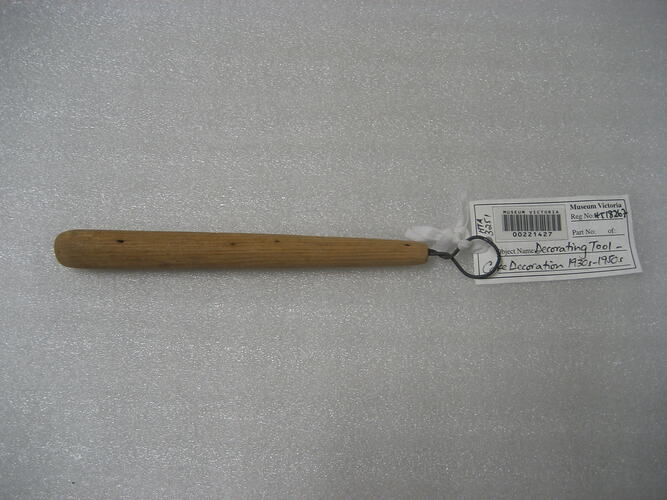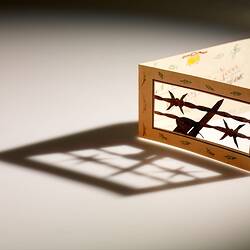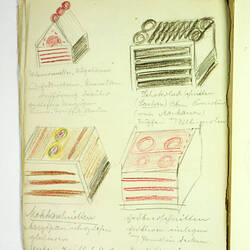Summary
One of three different 'grooving tools' with wooden handles and metal ends, used for dipping small cakes and chocolates into various coatings. The tools belonged to German pastry chef Karl Muffler and used by him during his career as a pastry chef in Melbourne from the 1930s and during teaching cake decorating at William Angliss College during the 1940s.
These items relates to Karl Friedrich Muffler, qualified pastry chef and confectioner, born in 1900, who migrated to Melbourne from Germany in 1930, aboard the passenger liner 'Balranald'. Muffler quickly established himself in Melbourne, commencing employment with Bill Ikinger (who had recruited and sponsored him) at his cake shop in Brunswick, as well as joining the long-running German establishment 'Club Tivoli'. Muffler went on to establish his own business, 'The Embassy' in Malvern, and in 1939 married fellow German migrant Mathilde 'Hilde' Mayer. At this time they were members of the 'German Labour Front' of which Adolf Mayer (Hilde's father) was president. On 4th September, 1939 Karl Muffler, along with dozens of other German residents (including his father-in-law), was placed into police custody as an enemy alien. He was transferred to Tatura internment camp in northern Victoria and while there undertook woodcarving and drafting classes and worked as a cake decorator. He was transferred to a Forestry Commission camp in Broadford, and finally released in 1945. With no family left in Germany he decided to stay in Australia and became naturalised in 1947. He and Hilde had two daughters. After the war, Muffler accepted a position at William Angliss Food Trades School in Melbourne teaching ex-servicemen new skills in cake decoration. He also worked at Paterson's cake shop in Windsor until well into the 1970s. He maintained a connection to the German community though Club Tivoli and died in 1996.
Physical Description
One of three different 'grooving tools' with wooden handles and metal ends. Two of these appear to have been hand fashioned from wood and wire with one having two metal prongs and the other being circular. The third tool is a professionally manufactured item that is double ended with different shaped metal ends. These tools were used for dipping small cakes and chocolates into various coatings.
Significance
This rich and diverse collection enables the exploration of a number of important historical themes, relating to migration as well as broader work and wartime narratives. Of key interest is the theme of working life and the proactive transporting of commercial and culinary traditions to Australia via the immigration process. Represented are the operational activities of pastry businesses around Melbourne in the 1930s, brought to life through tools and business records. The theme of internment and restriction of 'enemy aliens' during World War II can be explored through documents, mementoes, drawings, tokens and internment craft, and this collection is complemented by a large number of documents relating to Muffler held by the National Archives of Australia.The collection also provides a comprehensive overview of a migrant's experience: from garnering qualifications in country of origin to migrating; establishing a working life as practitioner and teacher; community connections and the subsequent consequences of those activities; the establishment of a domestic and social life, through marriage and ongoing cultural links; and the experiences of loss through separation through relocation, and loss of family due to war.
More Information
-
Collection Names
-
Collecting Areas
-
Acquisition Information
Donation from Ms Sue Muffler, 27 Apr 2005
-
Past Owner or User
Karl Friedrich Muffler, Melbourne, Greater Melbourne, Victoria, Australia, 1930s-1970s
It is difficult to determine for exactly how long Karl used the item but it may have been late into his professional career well into the 1970s, although the tool dates from around the 1930s-1950s. -
Classification
-
Category
-
Discipline
-
Type of item
-
Overall Dimensions
205 mm (Width), 20 mm (Height)
-
Keywords
Cake Decorating, Forestry Camps, German Communities, German Immigration, Internment Camps, Pastry Making


